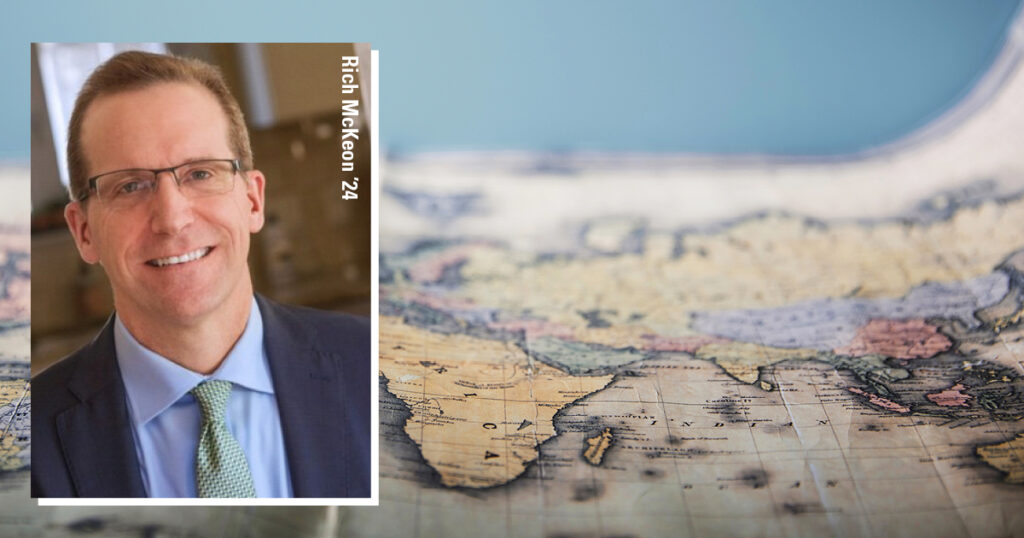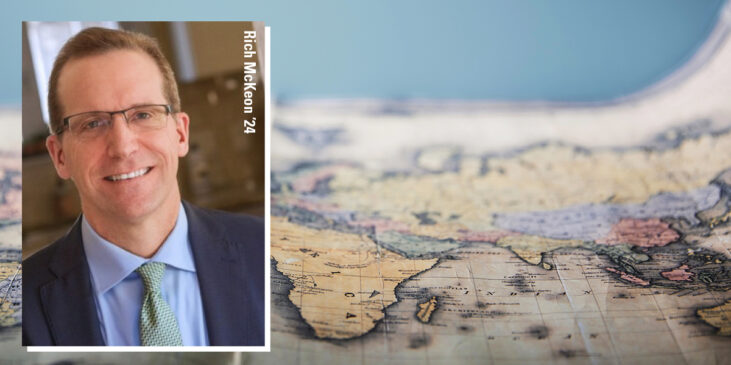
Students in the Asylum Clinic are trained to represent immigrant clients under faculty supervision, and they argue cases in the Immigration Court and before the Newark and New York Asylum Offices on behalf of refugees fleeing persecution in their home countries and seeking safety in the United States.
The work is a matter of life and death, and today we hear from Asylum Clinic student Rich McKeon ’24. He is busy representing a client who faces untenable circumstances in his home country, and McKeon and the Clinic team are fighting to gain permanent residency for his client in the United States. Some specific information has been omitted for the client’s safety.
Has anyone ever told you something they’ve never told anyone else in their life? A deep, dark secret that they didn’t want anyone to know—not even a best friend, a sibling, or a parent? When this happened to me, it was perhaps the moment when I fully understood the great honor and tremendous responsibility that comes with doing legal work for clients. Our client, who I’ll call David for privacy purposes, had just divulged to my professor, clinic partner, and me that he had been molested when he was 12 years old by a 20-year-old male relative. Young David was afraid that if he told a family member what was happening to him, he would be blamed for it—even though he was the victim—due to his family’s perception that he was gay. The molestation continued nearly every day for an entire year.
Although David had begun to have feelings for boys by age 12, he grew up in a very religious country, and being gay there was as unacceptable then as it is today. He prayed to God, hoping these feelings would go away; they didn’t, and he continued to suffer abuse. David is now 40, and he became HIV+ a few years ago but kept his life as a gay man and his HIV+ status from almost everyone in his life. He hid his sexual orientation from his employers with the full knowledge that he would be fired if he were found out. He could never be himself, and even close friends who knew he was gay didn’t know about his HIV+ status.
David’s life changed when he was violently assaulted by someone who learned of David’s HIV+ status. The hospital where David was being treated for his injuries told David’s family members—without his authorization—and this set in motion a series of additional beatings and verbal threats by David’s brother and cousin that compelled him to come to the United States for his own safety. However, while he was in New York, a cousin told him she had overheard David’s brother saying he would kill David if he returned to his home country. David’s brother said he had brought shame on the entire family, and the community in his home country would stop associating with the family if they found out. As a result, David knew that he could not return and is seeking asylum in the United States. If he were to go back, he’d subject himself to death threats, other potential violence, and workplace discrimination. And, he would never be able to live his life safely as an openly gay man.
David’s openness to sharing his most intimate life details is helping us craft an affidavit that will hopefully allow him to be granted asylum and remain permanently in the United States and eventually become a U.S. citizen.
We built David’s case by listening, empathizing, and documenting. Some say lawyers shouldn’t get emotionally involved in the cases of our clients, but I can’t see any other way to do this work effectively. Plus, it’s too late. My eyes have welled up with tears upon hearing the litany of stories of discrimination that have made life so unfair for David.
I’ve also been able to celebrate David’s successes. He excitedly texted us pictures of an apartment he recently rented in New York City—a sanctuary for his new life. He also gave us the fantastic news that his HIV is now undetectable.
David has a few more months before he can legally work in the United States. He was a teacher in his home country, and he misses the classroom. Given the way he talks about his work with students, you just know he was one of those fantastic teachers that students will always remember. I can’t wait until the day I get to see him teaching in a New York City classroom.
Until then, we wait for his case to be called. It could be called in a month, two years, or longer. We’ll continue to collect affidavits from key witnesses, including witnesses to violence he has experienced. We’ll also collect doctors’ affidavits that can show the emotional and physical toll David would suffer if he were forced to return to his home country.
Asylum is not an easy benefit to achieve. Cases must be well-documented and persuasive. But with David, I believe we have such a case, and I hope to see him remain safe and be able to thrive.
David isn’t used to receiving help from others. In his home country, he was the one giving money to people in need. And since his health has stabilized, he is thinking about how he can help others struggling with HIV. He also thinks about working in education again, because he enjoyed helping young people achieve their potential.
In the meantime, David continues to teach the people in his life. He teaches us about gratitude, demonstrating how thankful he is for his improved health and the way he can live his life as an openly gay man in New York City. He teaches us patience as he waits out a process of unknown and seemingly random duration.
I can’t wait to see all the great things David will do in the United States, and I know we would all be lucky to call him an American citizen.
Experiential Learning at New York Law School’s Plumeri Center
Experiential learning is an integral part of the NYLS education. The Plumeri Center is NYLS’s home for experiential learning, and the Center houses our many clinics, including the Asylum Clinic. Through our top-tier programs, we offer students the opportunity to turn theory into practice: Starting in their first year, students participate in counseling, interviewing, and negotiating exercises in their foundational Legal Practice course. During their upper-level years, students may select from a wide array of experiential learning courses to hone their lawyering skills. Together with a comprehensive legal education, these experiential offerings prepare our students for careers in advocacy.

